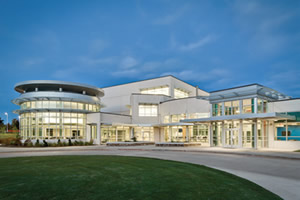Changing the Face of Education
- By Barbara C. Worth
- 12/01/15
 Dr. Phinnize J. Fisher Middle School, Greenville (S.C.) County Schools, is the recipient of the 2015 James D. MacConnell Award. Presented at the recent Association for Learning Environments (A4LE) Learning-SCAPES conference in San Diego, this prestigious award recognizes a comprehensive planning process that results in educational facilities that enhance the educational program, meet multiple goals and hold purpose and distinction within a community.
Dr. Phinnize J. Fisher Middle School, Greenville (S.C.) County Schools, is the recipient of the 2015 James D. MacConnell Award. Presented at the recent Association for Learning Environments (A4LE) Learning-SCAPES conference in San Diego, this prestigious award recognizes a comprehensive planning process that results in educational facilities that enhance the educational program, meet multiple goals and hold purpose and distinction within a community.
Renee Alexander, AIA, with BBT Architects and the jury chair commented, “All of this year’s entries were exceptional, making it an extremely difficult task for the jury. These projects reflected the innovative school planning and design work that is moving beyond the traditional world of schools as we know them and inspiring transformation in education for tomorrow’s learners and leaders.”
Dr. Phinnize J. Fisher Middle School is changing the face of education, translating the typical teacher-centered classroom into an experiential multidisciplinary program driven by problem-solving, discover, exploratory learning and an experience that requires each student to actively engage in a situation in order to find its solution.
“Fisher Middle School represents a model of collaboration between the school, the community, local business and industry, and the architect and engineering firm, said Dr. Burke Royster, superintendent of Greenville County Schools. “That collaboration resulted in a facility that not only serves as an effective learning environment, but is, in and of itself, a learning tool.”
A multidisciplinary planning team collaborated on the facility’s initial programming and design, evaluating curriculum, long-range planning, technology and important energy-efficient and environmentally-friendly strategies. The team included school district representatives, the design team McMillan Pazdan Smith and educational programming consultant Fielding Nair International.
Innovation is the key to discovering the solutions to the challenges facing the world today and in the future. A new pedagogy based on an integrated, collaborative and project based learning curriculum informed the STEAM middle school, providing a continuous pathway of education through opportunities that create STEAM-literate graduates ready to accept the challenges of the curriculum at high school, post-secondary education and point them in the right direction regarding their career choices.
Fisher Middle School’s flexible and adaptable learning spaces convey an atmosphere of a professional research facility with a balance of studio, collaboration and lab space. All of the learning communities provide easy adaptability so that teachers and students can morph their environments daily. Engaged project based learning can happen anywhere. Through partnerships with local businesses and other agencies, the Fisher students have unique opportunities that support this type of learning to occur.
The design of the $30-million school, the first in the state to receive the MacConnell Award, includes labeled, color-coded pipes that exhibit the flow and consumption of resources. The see-through, airy interior includes areas with exposed beams, x-bracing and columns that show the school’s physical properties, glass-wrapped communications and power panels that display technological functions, and a bio-retention pond for environmental lessons.
Honoring Dr. Phinnize J. Fisher, superintendent of Greenville County Schools from 2004-2012, Fisher Middle School embodies her educational philosophy focused on connecting children to the purpose of learning and helping them understand how success at school relates to a successful, fulfilling a meaningful life. Dr. Fisher’s vision and determination led to many innovative programs in Greenville County.
This article originally appeared in the issue of .
About the Author
Barbara C. Worth is the director of strategic and private development at the Association for Learning Environments (A4LE), formerly the Council of Educational Facility Planners (CEFPI). A4LE is the only professional organization whose primary purpose is improving the places where children learn. With approximately 4,400 members, A4LE encompasses six geographic regions across the United States, and supports regional representation in Canada, Australasia, and the UK. To learn more, visit www.a4le.org or follow us on Twitter @A4LE2.